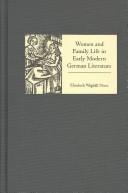| Listing 1 - 4 of 4 |
Sort by
|

ISBN: 1571131973 9786611949150 1281949159 1571136185 Year: 2004 Publisher: Rochester, N.Y. : Camden House,
Abstract | Keywords | Export | Availability | Bookmark
 Loading...
Loading...Choose an application
- Reference Manager
- EndNote
- RefWorks (Direct export to RefWorks)
Writers of sixteenth-century German popular literature took great interest in describing, debating, commenting on, and prescribing gender roles, and discourses of gender can be traced in texts of all kinds from this period. This book focuses on popular works by Georg Wickram, Jakob Frey, Martin Montanus, and Johann Fischart, all of whom published novels, joke books, plays and/or moral treatises on marriage and family life in Strasbourg in the sixteenth century. Their works express not only their own ideas on women's roles as wives and mothers, but also societal values at a time of religious, political, and cultural change. The view of gender issues provided by these writers is not a simple one, as they ascribed widely varying characteristics to 'woman' and her relationship to 'man.' The book thus analyzes the social and cultural construction of the concept of 'woman' as indicated not only by the narrators' comments, but also by the relationships and roles of men and women characters in the narratives. Overall, the focus is on the disparities that persisted in the sixteenth-century discourse of gender, confusing all attempts to arrive at definitive gender roles. In the end, the study argues for something that can best be described as a 'flowing continuity' or a 'continuous flow' in the discourses that form the sixteenth-century concepts of 'woman' and 'man.' Elisabeth Wåghäll-Nivre is associate professor of German at Växjö University, Sweden.
Families in literature. --- Family in literature. --- German literature --- Women and literature --- Women in literature. --- History and criticism. --- History --- Woman (Christian theology) in literature --- Women in drama --- Women in poetry --- Family in literature --- Literature
Book
ISBN: 144387891X 9781443878913 9781443874540 Year: 2015 Publisher: Newcastle upon Tyne Cambridge Scholars Publishing
Abstract | Keywords | Export | Availability | Bookmark
 Loading...
Loading...Choose an application
- Reference Manager
- EndNote
- RefWorks (Direct export to RefWorks)
In June 2012, scholars from a number of disciplines and countries gathered in Stockholm to discuss the representation of ancient mythology in Renaissance Europe. This symposium was an opportunity for the participants to cross disciplinary borders and to problematize a well-researched field. The aim was to move beyond a view of mythology as mere propaganda in order to promote an understanding of ancient tales and fables as contemporary means to explain and comprehend the Early Modern world. W...
Renaissance. --- Civilization, Medieval --- Civilization, Modern --- Classical influences. --- Ancient influences.
Book

ISBN: 9783110227567 Year: 2010 Publisher: Berlin Boston
Abstract | Keywords | Export | Availability | Bookmark
 Loading...
Loading...Choose an application
- Reference Manager
- EndNote
- RefWorks (Direct export to RefWorks)
Digital

ISBN: 9783110227567 9783110227550 Year: 2010 Publisher: Berlin ;; Boston De Gruyter
Abstract | Keywords | Export | Availability | Bookmark
 Loading...
Loading...Choose an application
- Reference Manager
- EndNote
- RefWorks (Direct export to RefWorks)
| Listing 1 - 4 of 4 |
Sort by
|

 Search
Search Feedback
Feedback About UniCat
About UniCat  Help
Help News
News